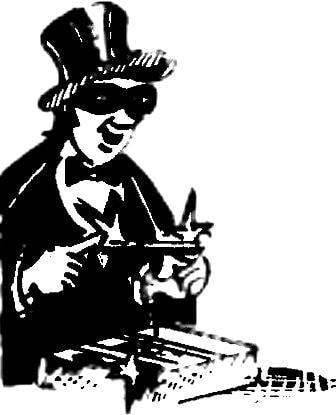Preparation of the electrolyte (distilled water is used): first, dissolve CDF3 , and then separately thoroughly mixed suspension SrSO4 and K2 SiF6 . The last two components, together with the sediment poured with stirring into the first solution, and the electrolyte is heated to 50°C. In this form, the composition is aged 40-50 hours, stirring occasionally and lifting it from the bottom of the vessel undissolved precipitate salts.
After cooling, the electrolyte can be considered ready to work. Study it requires.
The anodes are allowed to produce only alloy metals Pb, Sn and Sb (alloy composition given in early publications).
Mode chrome plating: the temperature of the electrolyte in the range of 50-58°C at a density of cathodic current between 45 and 90 A/DM2 . The best characteristics of the coating obtained at 55°C and 80 A/DM2 .
You should know that the main disadvantage of this electrolyte is its high chemical aggressiveness, therefore, is not subjected to plating of the workpiece surface (for example, the outer surface of the sleeve) you need to carefully close or leave the technological allowances for subsequent grinding. Itself is chrome plated in the electrolyte, fully meets the requirements of the motor.
Removing defective coatings is carried out using the following compositions (all you can use tap water):
1 — copper and copper alloys: hydrochloric acid 150 — 200 g/l, temperature 40-50°C, the time depends on the depth of cut of the coating and ranges from 20 minutes to one hour;
2 — aluminium and aluminium alloys chromic anhydride Shot 200-300 g/l, temperature 20-25°C, anode current density from 7 to 14 A/DM2 , the cathode material — steel, suspension material — aluminum;
3 — steel: caustic soda NaON 100-150 g/l, temperature 15-25°C, anode current density of 10-20 A/DM2 , the cathode material — steel, material of the suspension — steel.
Universal — aluminium
Great work on finding different ways of covering aluminium and its alloys (including silica) carried out in different conditions, in the end were crowned with success, and now we can safely recommend to universal composition of electrolytes for the entire spectrum used in the modelling of aluminium alloys. The main solutions with this technology two. The first (solution etching) consists of three parts HNO3 to one part HF. Both acid — concentrated; mix them very carefully and the finished mixture is stored in a plastic container. The second (solution-dip galvanizing): ZnO — 100 g/l, NaOH — 525 g/l, FeCl — 1 g/l and Sagatova salt — 10 g/L. the solution is prepared in the following order: diluted and cooled solution of NaOH is poured in advance prepared solution of Rochelle salt and a solution of FeCl. All mixed together. Then fall asleep zinc oxide and mixed again. After aging for one day at first muddy, the resulting solution becomes transparent and ready to work.
Technology zincate treatment: in the generic compositions of the following:
1 — the part is carefully degreased in gasoline B-70,
2 — repeat degreasing in acetone,
3 — a detail wash in water,
4 — etching in the mixture of acids at temperatures up to 20°C for 3-5 s,
5 — rinse under running water
6 — zincate treatment at temperatures up to 27°C for 20-25 s,
7 — rinse under running water
8 — re-etching in the mixture of acids at temperatures up to 20°C for 5-8 s,
9 — rinsing in running water,
10 — re-zincate treatment at 27°C for 40-60 s,
11 — thorough rinsing parts under running water.
Therefore, the item is preparing to plating, after which it is mounted on the mandrel and under the current is suspended in the chromium plating bath. It should be noted that the intermediate finding items outdoors should be kept to a minimum. While fully prepared the item must remain in cincinna solution over 15 minutes (until the suspension in the chromium plating bath).
The proposed technology is tested on the following materials: D16T, al-4, AK-4, AK-6, AMO Д1Т, al-30, al-25, AK-21, — and everywhere the chrome platings were equally high quality, and in the process of the work of engines of chrome chipping and peeling of coatings was not observed.
V. KRIEGER, master of sports of international class
Recommend to read THE FENCE IN THE ROOM… Among plants there are those that do not fit on the sill: their picturesque overgrown bushes contain large floor boxes with trays or tubs. And if the plants themselves look beautiful,... THE INSTRUMENTAL-REVOLVER Shield with instruments convenient, but takes a lot of space on the wall. To combine ease of use with economical home location of instrumentals that will allow such revolving design: the...  In the “M-K” No. 8 for the year 1991 was published an article devoted to the technology of processing of shells for cylinder-piston pairs of current model engines. Judging by the numerous reader responses, this topic is highly relevant and widely recognized. Therefore, in addition to already published material, we offer a number of tips that will allow Amateur and professionals made the crossing of the micro-motors to reach the heights of excellence in their field.
In the “M-K” No. 8 for the year 1991 was published an article devoted to the technology of processing of shells for cylinder-piston pairs of current model engines. Judging by the numerous reader responses, this topic is highly relevant and widely recognized. Therefore, in addition to already published material, we offer a number of tips that will allow Amateur and professionals made the crossing of the micro-motors to reach the heights of excellence in their field.
